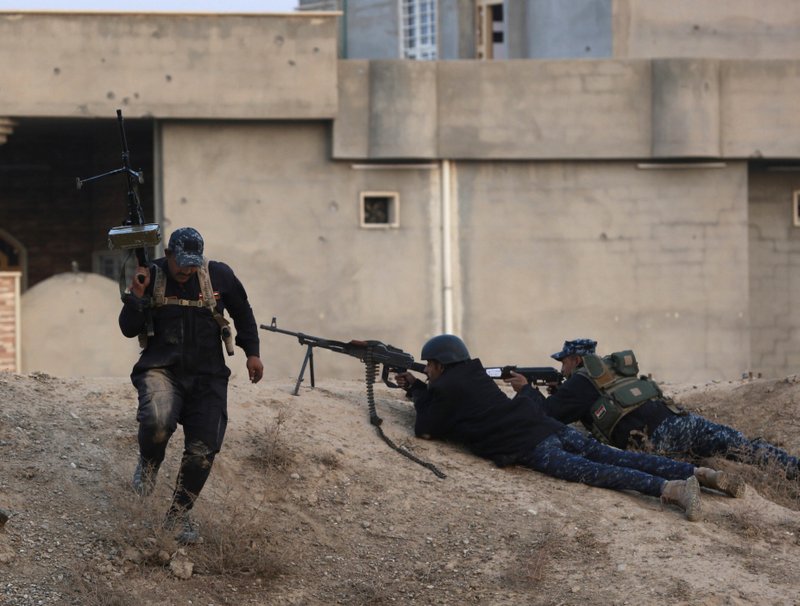BEIRUT -- Islamic State militants re-entered the historic city of Palmyra in central Syria on Saturday for the first time since they were expelled by Syrian and Russian forces nine months ago.
The activist-run Palmyra Coordination network said the militants had nearly encircled the city and entered its northern and northwestern neighborhoods.
The group, which maintains contacts inside the city, said fighters with the Islamic State extremist group were approaching the city's UNESCO heritage site as well.
Osama al-Khatib, an activist with the network, said government soldiers were fleeing Palmyra.
"The army as an institution has dissolved," he said. Some soldiers and militiamen remain in the city, along with 120 families who have not been able to leave, Khatib said.
He spoke to The Associated Press from Gaziantep, Turkey.
"There is strong fighting on all sides," he reported. "There is no exit except through a corridor to the west."
The reversal in Palmyra came days after Islamic State militants in the Iraqi city of Mosul launched a fierce counterattack that surprised Iraqi soldiers, killing at least 20 and halting the Iraqis' advance.
Iraqi special forces units have entered the eastern outskirts of the largest remaining Islamic State-held city, but their advance has been greatly slowed by a desire to limit civilian casualties and the resilience of the Islamic State fighters.
During the 10 months that the Islamic State held Palmyra, from May 2015 to March, the militants dynamited several of the city's famed ancient Roman monuments and executed its archaeological director.
After the city was retaken, the Russian government staged a classical music concert in the city's soaring Roman amphitheater last May to celebrate the success.
The Syrian and Russian government maintain they are defending the global community against Islamic terrorism in the country's devastating 5½-year war.
After taking Palmyra, the two states turned their attention to wiping out the Syrian opposition in Damascus and Aleppo, leaving the city relatively unguarded.
Syrian state media had no comment.
Mohammad Hassan Homsi of the Palmyra News Network reported that a military division withdrew from the city earlier Saturday without leaving a way out for civilians.
According to Homsi, only 350 families had returned to the city of its original 30,000 inhabitants after the government retook the city in March.
Islamic State militants were shelling the government's military airport to the east of the city, according to the Coordination group.
The Britain-based Syrian Observatory for Human Rights said the militants reached the city's Tadmor Hospital and its wheat silos.
The militants advanced on Palmyra after seizing several government positions, oil fields, and strategic hilltops in the surrounding countryside in a lightning three-day campaign.
U.S. support
Elsewhere Saturday, U.S. Secretary of Defense Ashton Carter announced from Bahrain that an additional 200 U.S. soldiers would be dispatched to Syria to accelerate the push on the self-declared Islamic State capital of Raqqa.
The 200, to include special operations troops, are in addition to 300 already authorized for the effort to recruit, organize, train and advise local Syrian Arab and Kurdish forces to fight the Islamic State.
"These uniquely skilled operators will join the 300 U.S. special operations forces already in Syria, to continue organizing, training, equipping, and otherwise enabling capable, motivated, local forces to take the fight to ISIL," Carter said, using an alternative acronym for the extremist group.
"By combining our capabilities with those of our local partners, we've been squeezing ISIL by applying simultaneous pressure from all sides and across domains, through a series of deliberate actions to continue to build momentum."
The coalition of Syrian Arab and Kurdish fighters that has been working with U.S. trainers and advisers said Saturday that it will expand operations against the Islamic State in northern Syria.
The predominantly Kurdish Syrian Democratic Forces, which control most of the frontier with Turkey, announced that they were moving to the second phase of their "Wrath of the Euphrates" operations after recapturing dozens of villages from the extremists north of Raqqa.
The coalition said it would now isolate Raqqa from the west.
On his final tour of the Mideast as Pentagon chief, Carter cast the new troop commitment as evidence that the U.S. backs its anti-Islamic State vows with military muscle.
He defended the efforts of President Barack Obama and his administration to defeat the extremists, and he said the region's Arab powers need to stop complaining of U.S. shortcomings and do more to protect their own neighborhoods.
"They need to get in the game," he said.
The new troop commitment came as U.S. military commanders aim to advance the push to capture Raqqa using the Syrian Democratic Forces.
Military leaders hoped the operation could get underway relatively soon, increasing pressure on the Islamic State amid the ongoing offensive to take Mosul.
But they have faced challenges, including the difficulty of finding enough Arab fighters for an operation seeking to clear militants from an Arab city.
A military offensive by Turkey, which views the U.S.-backed Kurdish forces as part of a insurgent group threatening its own core interests within Syria, has only complicated that already difficult mission.
The White House has expanded U.S. military involvement in Syria as the Islamic State threat has surged and as diplomatic efforts have failed to broker an end to the war.
Information for this article was contributed by Philip Issa, Dominique Soguel and Robert Burns of The Associated Press; and by Missy Ryan of The Washington Post.
A Section on 12/11/2016

